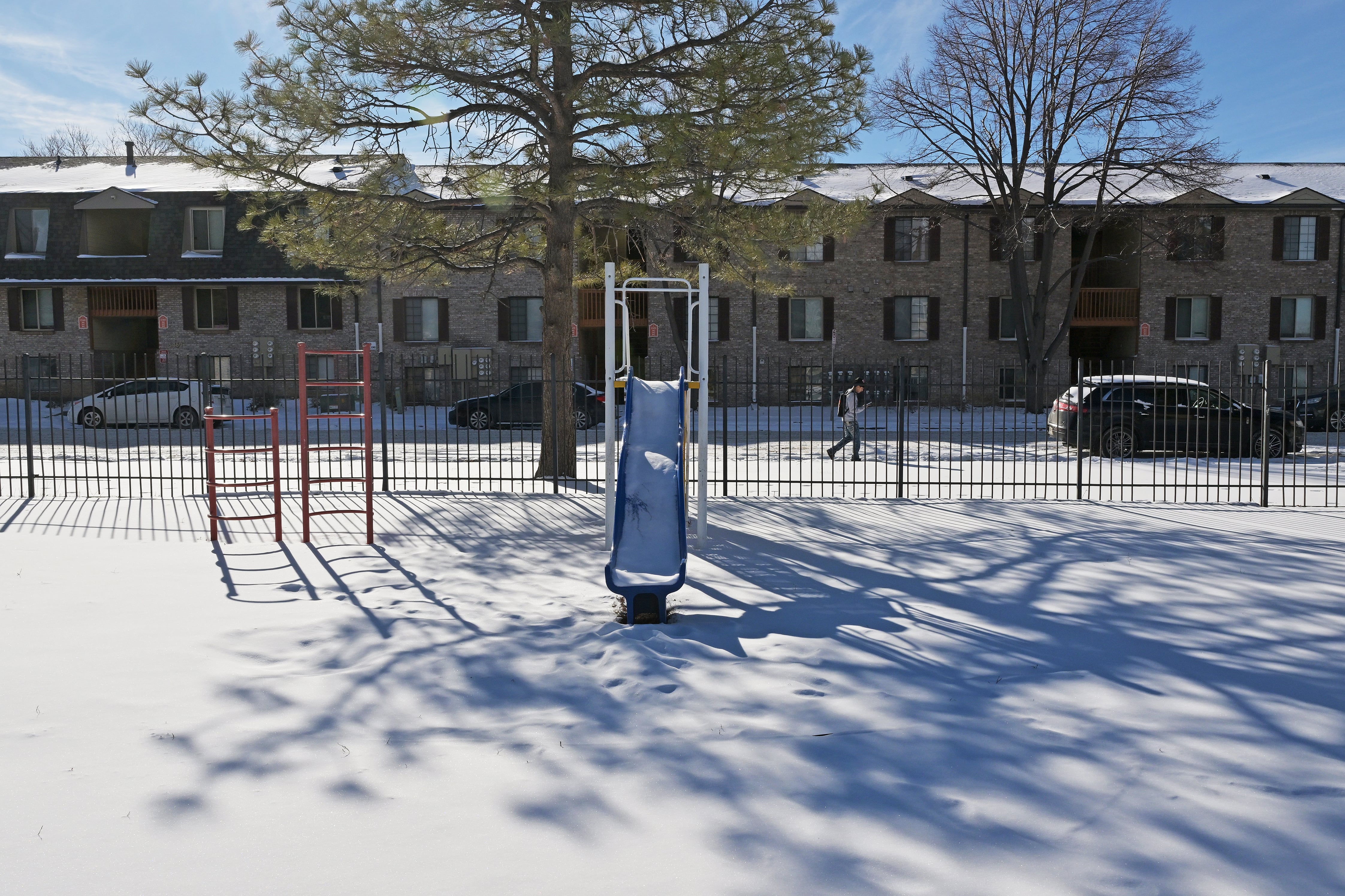Sign up for Chalkbeat Colorado’s free daily newsletter to get the latest reporting from us, plus curated news from other Colorado outlets, delivered to your inbox.
Attendance had already been low for about a week at Laredo Elementary School in Aurora when federal immigration agents showed up at an apartment building down the street before school started Wednesday, according to teachers.
The first hour of classes that day was punctuated by the sound of a plane circling above and dark SUVs driving up and down the street, a teacher said. At one point, one of the SUVs parked next to the school’s crosswalk.
While some students in Nate Madson Dion’s fifth grade class were absent, most made it to class, where he said “they have people they trust, and they feel safe. But all that concern is still lurking.”
A third grader emailed her teacher to explain that she wasn’t at school because she hadn’t been able to leave her home because of the raids. “Hopefully, I’ll be back tomorrow,” she wrote, according to Madson Dion.
The Aurora school district had attendance of 89.44% on Wednesday and was at 92.25% the following day. According to Colorado Public Radio, attendance in the district had dipped to 79% on Jan. 30, the day the raids had been rumored to start.
In Denver schools, the district’s most recent lowest attendance date was Feb. 3 during a national movement for a Day Without Immigrants, but it had bounced back to about 86.9% on Feb. 5.
Madson Dion overheard his students having conversations about the raids last Thursday. A student who had been at the apartment building was telling the kids about it. He said seven people were taken from his building and some doors were knocked down.
Madson Dion said he stuck to most of his lessons for the day. He doesn’t guide any conversations about what’s happening outside, but lets students talk when they initiate conversations. He chimes in when he has information that could be helpful to students, he said.
“It’s super important for me to allow it to happen, while also not pressing it,” Madson Dion said. When a student was wondering what would happen if immigration agents knocked on his door, Madson Dion chimed in and told students, “Just don’t answer the door.”
Students already knew that, he said.
“Fifth graders know about warrants. Fifth graders shouldn’t have to know about warrants,” he said. “We have kids who are resilient in ways I wish they didn’t have to be.”
At nearby Hinkley High School, math teacher Beth Himes said her students had experienced many of the same things. Some had seen raids taking place and residents of apartment buildings hiding on rooftops.
“Students on their way to school had filmed people on top of a roof as they drove past the apartment complexes, and that was going around the school,” Himes said. “Students were all abuzz, they were very nervous, they were worried. Not necessarily for themselves, but for parents, other family, friends, neighbors.”
Her classroom has large windows through which students could see the immigration enforcement vehicles driving past.
The night of the raids was parent-teacher conference night at Hinkley.
Himes usually has between 12 and 14 parent meetings in a night. Last Wednesday, Himes only had six parent meetings. One parent had emailed her to ask for the information through email, and cited the raids for feeling unsafe to go meet Hines in person.
Most classes at Hinkley have gone on as normal, and while attendance is down, it hasn’t been significantly lower on any particular day, Himes said. Similar to at Laredo, she said she believes Hinkley students feel as safe as they can while they are at school. But getting to and from school can feel dangerous for them or their families.
“I think their anxiety goes up when they leave,” Himes said.
At Laredo, when an immigration SUV parked in the crosswalk in front of the school, some families felt uncomfortable crossing the street in front of that agent, so the families waited inside the school until they felt safe to leave again.
Teacher says it matters when leaders talk about immigration
In the nearby Adams 12 school district, the superintendent told his school board on Wednesday night that immigration concerns are taking a lot of time to address.
Superintendent Chris Gdowski said the district believed the parent of one Adams 12 student had been detained in Wednesday’s raids and that the child was in the temporary care of a neighbor.
Attendance had been down by as much as 5% at some Adams 12 schools, and the district was trying to problem-solve with families to find ways to get students back in classes, or find ways to keep them learning while at home, Gdowski said
“It’s become a fairly significant part of many of our jobs on the security side in coordinating with our principals about what to do if this happens, and then there’s also fairly consistent communication needs that we have,” he said.
At a meeting the day after the raids, the Jeffco school board discussed the fears that seem to be keeping some children home from school. Although Jeffco didn’t discuss large attendance rate drops, staff told the board they will present recommendations for the superintendent in the next couple of weeks on how to help students who don’t feel safe coming into classes physically.
The board workshopped the language for a resolution it will vote on this Thursday to show support for immigrant and LGBTQ students who may be feeling unsafe. But board members struggled with some of the language, because they wondered what they could guarantee doing for students, especially as things keep changing.
Board member Paula Reed, was hesitant about saying the district won’t collect or share immigration information from students or families, because she said it’s possible the district could be forced to do so in the near future. Board members also wondered if they could control what happens outside their school buildings, and whether they should state that immigration actions that happen near schools are disruptive to students.
Aurora passed a resolution Tuesday that is nearly identical to one the board approved in 2017 written with parent and student groups. It states that as one of the most diverse districts in the state, Aurora is dedicated to supporting and serving all students. The resolution includes updated demographic information showing that the district’s students now speak more than 160 different languages and that more than 42% of all students are learning English as a new language.
The resolution adds a requirement that Aurora schools update student emergency contact information twice a year instead of once per year and encourages families to include a non-family contact in case family members can’t pick up students.
Himes said the Aurora resolution matters because it supports school staff’s desire to keep students safe and to communicate that desire to the families and students themselves.
“It’s just been very well-communicated,” Himes said. “That’s the key.”
Yesenia Robles is a reporter for Chalkbeat Colorado covering K-12 school districts and multilingual education. Contact Yesenia at yrobles@chalkbeat.org.







